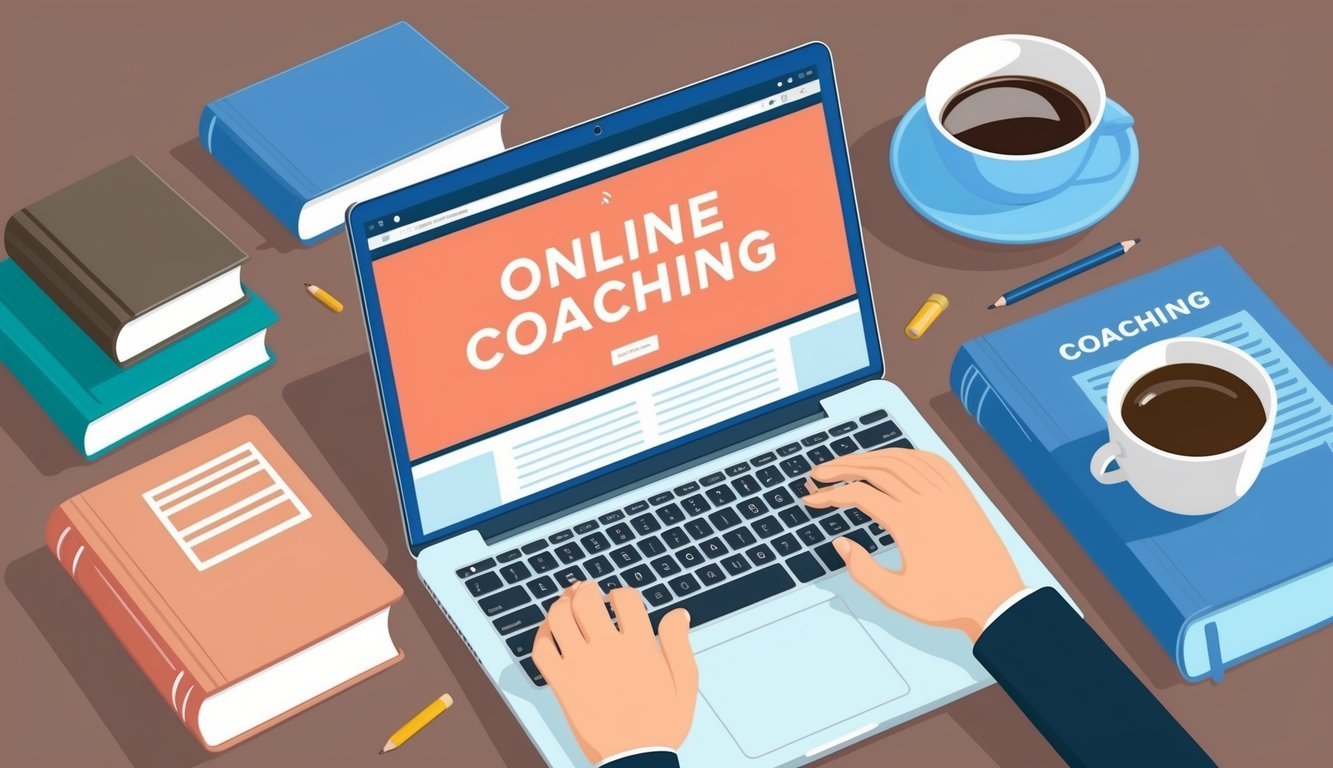Online coaching has emerged as a lucrative and flexible side hustle in recent years.
The global coaching market is booming, with estimated revenues reaching $4.564 billion in 2023 – a 60% increase from 2019.
This rapid growth indicates a growing demand for online coaches across various niches, from business to personal development.
As an online coach, you can earn anywhere from $50 to $500 per hour, depending on your expertise and target market. This wide range reflects the diverse opportunities available in the coaching industry.
Whether you’re passionate about helping others achieve their fitness goals, advance their careers, or improve their personal relationships, there’s likely a coaching niche that aligns with your skills and interests.
Starting an online coaching business as a side hustle offers numerous advantages.
You can work from anywhere, set your own schedule, and gradually build your client base while maintaining your primary source of income.
This approach allows you to experiment, learn, and grow at your own pace, focusing on long-term success rather than immediate financial pressure.
Key Takeaways
- Online coaching is a rapidly growing industry with significant earning potential
- You can start your coaching business as a flexible side hustle while maintaining your current job
- Success in online coaching requires continuous learning and skill development
Exploring the World of Online Coaching
Online coaching offers a flexible and rewarding side hustle opportunity.
It allows you to share your expertise while helping others achieve their goals.
Defining Online Coaching
Online coaching involves providing guidance and support to clients remotely.
You can offer your services through video calls, messaging apps, or specialized coaching platforms.
As a coach, you’ll help clients overcome challenges and reach their objectives.
Online coaching services span various fields, including business, personal development, and life coaching.
You might specialize in career advancement, fitness, relationships, or any area where you have expertise.
Your role is to listen, ask insightful questions, and provide tailored advice.
You’ll create action plans and hold clients accountable for their progress.
Benefits of Coaching as a Side Hustle
Coaching offers numerous advantages as a side gig.
You can set your own hours and work from anywhere, making it ideal for balancing with a full-time job.
It’s a lucrative venture with growing demand.
The global online coaching market is booming, with revenues expected to reach $4.564 billion in 2023.
You’ll enjoy personal growth as you help others.
Coaching sharpens your communication and problem-solving skills, benefiting your primary career.
Starting costs are low.
You mainly need a reliable internet connection and a quiet space for video calls.
Comparison to Other Side Hustles
Online coaching stands out among side hustles for its scalability and personal impact.
Unlike gig economy jobs, you’re building a business with long-term potential.
Compared to dropshipping or affiliate marketing, coaching offers deeper client relationships.
You’re directly involved in your clients’ success stories.
Remote coaching provides more flexibility than in-person tutoring or consulting.
You can serve clients worldwide without geographical limitations.
While blogging or podcasting may take time to monetize, coaching can generate income quickly.
You’re offering a high-value service that clients are willing to pay for immediately.
Setting Up Your Online Coaching Business
Starting an online coaching business requires careful planning and a clear understanding of your goals.
You’ll need to develop a solid business plan, identify your target audience, and choose a specific coaching niche to succeed.
Developing a Business Plan
Your business plan serves as a roadmap for your coaching venture.
Start by defining your mission statement and outlining your services.
Include financial projections, pricing strategies, and marketing plans.
Consider your startup costs, such as website development, coaching software, and marketing materials.
Set realistic revenue goals for your first year and beyond.
Don’t forget to outline your unique value proposition.
What makes your coaching services stand out? How will you deliver value to your clients?
Include a timeline for launching and scaling your business.
Be flexible, as you may need to adjust your plan as you learn and grow.
Identifying Your Target Audience
Knowing your target audience is crucial for your coaching business.
Think about who would benefit most from your expertise and services.
Consider demographics like age, profession, and income level.
What challenges do they face? What are their goals and aspirations?
Create detailed client personas to guide your marketing efforts.
This will help you tailor your messaging and offerings to attract the right clients.
Understand your target audience’s preferred communication channels.
Are they active on social media? Do they prefer email or video calls?
Remember, it’s better to focus on a specific group rather than trying to appeal to everyone.
This allows you to become an expert in serving their unique needs.
Choosing a Niche in Coaching
Selecting a niche is essential for differentiating yourself in the coaching market.
Consider your expertise, passions, and areas where you can provide the most value.
Popular coaching niches include career coaching, health and wellness, relationship coaching, and business coaching.
You might also specialize in areas like productivity, leadership, or personal finance.
Research potential niches to ensure there’s demand for your services.
Look for gaps in the market where you can offer unique solutions.
Your chosen niche should align with your skills and experience.
It’s easier to build credibility when you have a track record in your area of focus.
Don’t be afraid to narrow your niche further.
For example, instead of general business coaching, you might focus on coaching female entrepreneurs in the tech industry.
Crafting Your Unique Value Proposition
Your value proposition sets you apart in the competitive coaching market.
It’s the key to attracting clients and building your personal brand.
Let’s explore how to create a compelling proposition that showcases your expertise.
Understanding What Sets You Apart
Identify your unique strengths and experiences.
What makes your coaching approach special? Perhaps you have a background in psychology or business that informs your methods.
Think about the specific results you’ve helped clients achieve.
Have you guided someone to a major career change or helped a business owner double their revenue?
Consider your coaching style.
Are you known for tough love or a more nurturing approach? Your personality can be a big part of your appeal.
Make a list of your top skills and areas of expertise.
This might include things like active listening, goal-setting strategies, or industry-specific knowledge.
Communicating Your Expertise
Once you’ve identified your unique qualities, it’s time to package them into a clear, compelling message.
Your value proposition should be concise and memorable.
Focus on the benefits clients will receive.
Instead of saying “I offer weekly coaching sessions,” try “You’ll gain clarity and achieve your goals faster with personalized weekly guidance.”
Use specific language that resonates with your target audience.
If you’re a business coach, you might mention “increasing profitability” or “streamlining operations.”
Practice delivering your value proposition out loud.
It should feel natural and authentic to you.
Consider creating a tagline that encapsulates your unique offering.
This can be a powerful tool for your personal brand.
Remember to update your value proposition as you grow and evolve in your coaching career.
Your unique selling points may change over time.
Legal Considerations and Certification

Starting an online coaching business involves more than just passion and expertise.
You’ll need to navigate legal requirements and consider professional certifications to build credibility and protect your business.
Registrations and Legalities
To launch your online coaching business, you’ll need to handle some legal paperwork.
First, choose a business structure like sole proprietorship or LLC.
Register your business name with local authorities.
Get an Employer Identification Number (EIN) from the IRS for tax purposes.
Check if you need any specific licenses or permits for coaching in your area.
Create a professional website to showcase your services.
Draft clear contracts and agreements for your clients, outlining your services, fees, and policies.
Consider getting professional liability insurance to protect yourself from potential claims.
It’s wise to consult with a lawyer familiar with the coaching industry to ensure you’re covering all legal bases.
The Importance of Coaching Certification
While not always mandatory, coaching certification can add credibility to your business.
It demonstrates your commitment to professional standards and ethical practices.
Look into reputable coaching organizations like the International Coach Federation (ICF) for certification programs.
These programs often cover coaching ethics, techniques, and business practices.
Certification can help you stand out in a crowded market.
It may also lead to higher earning potential as clients often prefer certified coaches.
Remember, certification is an ongoing process.
You’ll need to maintain your credentials through continued education and professional development.
This keeps your skills sharp and shows clients you’re committed to growth.
Marketing Your Online Coaching Services
Effective marketing is crucial for attracting clients and growing your online coaching business.
Focus on building a strong online presence, implementing a referral program, and leveraging social media to reach your target audience.
Building a Strong Online Presence
Start by creating a professional website that showcases your coaching services and expertise.
Include testimonials from satisfied clients to build credibility. Optimize your website with keywords that potential clients might use when searching for coaching services like yours.
Develop a blog or podcast to share valuable content related to your coaching niche.
This helps establish you as an authority in your field and improves your search engine rankings.
Consider guest posting on popular industry blogs or being interviewed on relevant podcasts to expand your reach.
These activities can help you build your personal brand and attract more potential clients to your online coaching business.
Implementing a Referral Program
Encourage your satisfied clients to spread the word about your coaching services.
Set up a referral program that offers incentives for both the referrer and the new client.
You could offer a discount on future sessions for successful referrals or provide exclusive content as a thank-you gift.
Make it easy for clients to refer others by providing them with shareable links or personalized referral codes.
Follow up with referred leads promptly and provide them with a special welcome offer.
This approach can help you grow your coaching business through word-of-mouth marketing, which is often more effective than traditional advertising.
Using Social Media Effectively
Choose social media platforms where your target audience is most active.
Create engaging content that showcases your expertise and provides value to your followers.
Use a mix of content types, such as short videos, infographics, and text posts.
Share client success stories and testimonials to build trust with potential clients.
Promote your coaching services on YouTube by creating helpful video content.
This can be an effective way to demonstrate your coaching style and connect with potential clients visually.
Engage with your followers by responding to comments and hosting live Q&A sessions.
Consider running targeted social media ads to reach a wider audience interested in your coaching niche.
Designing Your Coaching Programs and Packages

Creating effective coaching packages requires thoughtful planning and tailoring to your clients’ needs.
You’ll need to consider various formats and delivery methods to provide maximum value and results.
Creating One-on-One Coaching Sessions
One-on-one coaching sessions form the foundation of many successful coaching businesses.
To design these sessions, start by determining the ideal length and frequency.
Many coaches offer 45-60 minute sessions on a weekly or bi-weekly basis.
Consider creating a structured program with a defined timeline, such as a 3-month package.
This allows you to set clear goals and milestones for your clients.
Begin each program with an initial assessment to understand your client’s background, current situation, and aspirations.
Use this information to tailor your approach and create a personalized action plan.
Incorporate accountability measures and progress tracking tools to help your clients stay motivated and on track.
You might include email check-ins between sessions or provide worksheets and exercises for clients to complete.
Developing Group Coaching Experiences
Group coaching offers a cost-effective option for clients while allowing you to serve more people simultaneously.
When designing group programs, focus on creating a supportive community environment.
Determine the ideal group size – typically 6-12 participants work well.
Choose a specific theme or goal for the group, such as career transitions or leadership development.
Structure your group coaching program with a mix of:
- Live group calls or webinars
- Peer accountability partnerships
- Online discussion forums
- Shared resources and materials
Consider offering both short-term intensive programs (4-8 weeks) and longer-term experiences (3-6 months) to cater to different client needs and preferences.
Offering Online Courses
Online courses provide a scalable way to share your expertise with a broader audience.
When developing your course, start by identifying a specific problem you can help solve or a skill you can teach.
Break down your course content into digestible modules, each focusing on a key concept or skill.
Use a variety of content formats to engage different learning styles:
- Video lessons
- Written materials
- Quizzes and assessments
- Downloadable worksheets and templates
Incorporate interactive elements like live Q&A sessions or a private community forum to provide additional support and foster engagement among participants.
Consider offering different tiers of your course, such as a self-paced option and a premium version with added personal coaching sessions.
This allows you to cater to various budget levels and learning preferences.
Online Platforms and Tools for Coaches

Navigating the digital landscape as a coach requires the right platforms and tools to support your business.
These resources can streamline your operations and enhance your client interactions.
Selecting the Right Coaching Platform
When choosing a coaching platform, consider your specific needs and budget.
Simply.Coach offers an all-in-one solution for coaches, consultants, and therapists.
It can help you digitize your business and simplify administrative tasks.
Mighty Networks provides features for community building, group coaching, and course creation.
This platform could be ideal if you want to foster a sense of community among your clients.
For those focusing on one-on-one coaching, Paperbell might be a good fit.
It handles scheduling, reminders, and online contract signing, freeing up your time for actual coaching.
Leveraging Learning Management Systems
Learning Management Systems (LMS) can significantly enhance your coaching offerings.
Thinkific is a popular choice, allowing you to create and sell online courses alongside your coaching services.
Udemy, while primarily known as a course marketplace, can be a valuable tool for coaches.
You can use it to create courses that complement your coaching programs, reaching a wider audience and potentially attracting new clients.
When selecting an LMS, consider factors like ease of use, customization options, and integration capabilities with your existing tools.
Look for platforms that offer features like quizzes, progress tracking, and certificates to enhance your clients’ learning experience.
Enhancing Your Coaching Skills

Improving your coaching abilities is crucial for success in the online coaching business.
Continuous learning and client feedback are key elements to refine your skills and deliver better results.
Continuous Education and Training
Stay up-to-date with the latest coaching techniques and industry trends.
Attend webinars, workshops, and conferences focused on personal development and coaching methodologies.
Consider pursuing certifications in specific coaching niches to boost your credibility.
Read books and articles written by successful life coaches.
Follow thought leaders in the coaching industry on social media platforms.
Join professional coaching associations to network with peers and access valuable resources.
Expand your skill set by learning complementary skills like effective communication, active listening, and goal-setting techniques.
Practice these skills regularly with friends, family, or fellow coaches to sharpen your abilities.
Feedback Collection and Analysis
Regularly seek feedback from your coaching clients to understand their needs and improve your services.
Create anonymous surveys or conduct one-on-one sessions to gather honest opinions about your coaching style and effectiveness.
Pay attention to both positive and negative feedback.
Identify patterns in client responses to pinpoint areas for improvement.
Use constructive criticism as an opportunity to grow and refine your coaching approach.
Implement changes based on client feedback and monitor the results.
Continuously adapt your coaching methods to better serve your clients’ needs and preferences.
Remember, client satisfaction is crucial for the success of your online coaching business.
Expanding Your Side Hustle Into a Full-Time Career

Turning your coaching side hustle into a thriving full-time business requires strategic planning and dedication.
Many successful coaches have made this transition, finding both financial success and personal fulfillment in their new careers.
From Side Hustle to Full-Time
To transform your coaching side hustle into a full-time gig, start by assessing your current client base and income.
Are you solving a problem or fulfilling a need in the market? If so, you’re on the right track.
Next, create a solid business plan.
This should include your niche, target audience, and financial projections.
Don’t forget to factor in expenses like marketing and software tools.
Gradually increase your coaching hours and client roster.
As your income grows, consider reducing hours at your day job.
This transition period allows you to build your business while maintaining financial stability.
Invest in your skills and credentials.
Continuous learning will help you stay competitive and provide more value to your clients.
Success Stories in the Coaching Industry
Many coaches have successfully transitioned from side hustle to full-time careers.
Take Sarah, for example.
She started coaching part-time while working in HR.
Within a year, her client list grew, allowing her to quit her day job and focus on coaching full-time.
John, a business coach, leveraged his expertise in startups to attract clients.
He now runs a thriving coaching practice, helping entrepreneurs launch and scale their businesses.
These success stories share common themes: identifying a niche, consistently delivering value, and building a strong reputation.
By following their lead, you too can turn your coaching side hustle into a rewarding full-time career.
Maintaining Balance and Managing Growth

Starting a side hustle coaching business can be exciting, but it’s crucial to maintain balance with your day job and personal life.
You’ll need to manage your time effectively to succeed.
Consider setting aside one hour per week for your coaching business.
This small commitment can help you build momentum without overwhelming your schedule.
Create a realistic routine that includes:
- Coaching sessions
- Marketing efforts
- Skill development
- Personal time
Remember, your side hustle should bring you joy and fulfillment.
If it feels like a chore, reassess your approach.
As your coaching business grows, you might face new challenges.
Stay organized by using tools like:
- Calendar apps
- Project management software
- Financial tracking systems
Don’t forget to prioritize your own personal development.
Continuous learning will enhance your coaching skills and keep you motivated.
Be patient with your progress.
Embrace a growth mindset and celebrate small wins along the way.
Your side hustle can evolve at its own pace while you maintain balance in other areas of your life.
Consider diversifying your coaching offerings as you grow.
This can include:
- Group coaching sessions
- Online courses
- E-books or guides
By expanding your services, you can increase income without necessarily working more hours.
This strategy helps maintain work-life balance while scaling your business.
Frequently Asked Questions

Starting an online coaching business as a side hustle raises several common questions.
Here are answers to some of the most frequently asked questions about launching and growing a coaching practice alongside your main job.
How can I balance my main job with starting a coaching business on the side?
Time management is crucial.
Set aside specific hours for coaching activities outside your regular work schedule.
Use your lunch breaks or early mornings for client calls.
Batch similar tasks together to maximize efficiency.
For example, dedicate one evening to content creation and another to administrative work.
What are the first steps to take when launching a personal development coaching side hustle?
Define your niche and target audience.
Identify the specific problems you’ll help clients solve.
Create a basic website showcasing your services and expertise.
Develop a simple coaching program or package to offer initially.
What strategies are most effective for attracting clients to a new online coaching business?
Leverage your existing network.
Let friends, family, and colleagues know about your new venture.
Create valuable content on social media platforms relevant to your target audience.
Offer free discovery calls to potential clients to build trust.
Which platforms are best for offering personal development coaching services remotely?
Zoom is popular for video coaching sessions.
Skype and Google Meet are also widely used alternatives.
For scheduling, tools like Calendly or Acuity can streamline the booking process.
Consider platforms like Coach.me or Thumbtack to connect with potential clients.
How do I set pricing for my coaching services without undercharging or overcharging?
Research competitors in your niche to gauge market rates.
Consider your experience level and the value you provide.
Start with a lower introductory rate to attract initial clients.
Gradually increase your prices as you gain experience and testimonials.
Tips for creating engaging content to promote your coaching business:
Focus on solving your target audience’s specific problems.
Share practical tips and actionable advice they can implement immediately.
Use a mix of content formats like blog posts, short videos, and social media updates.
Be consistent in your posting schedule to build an audience.


